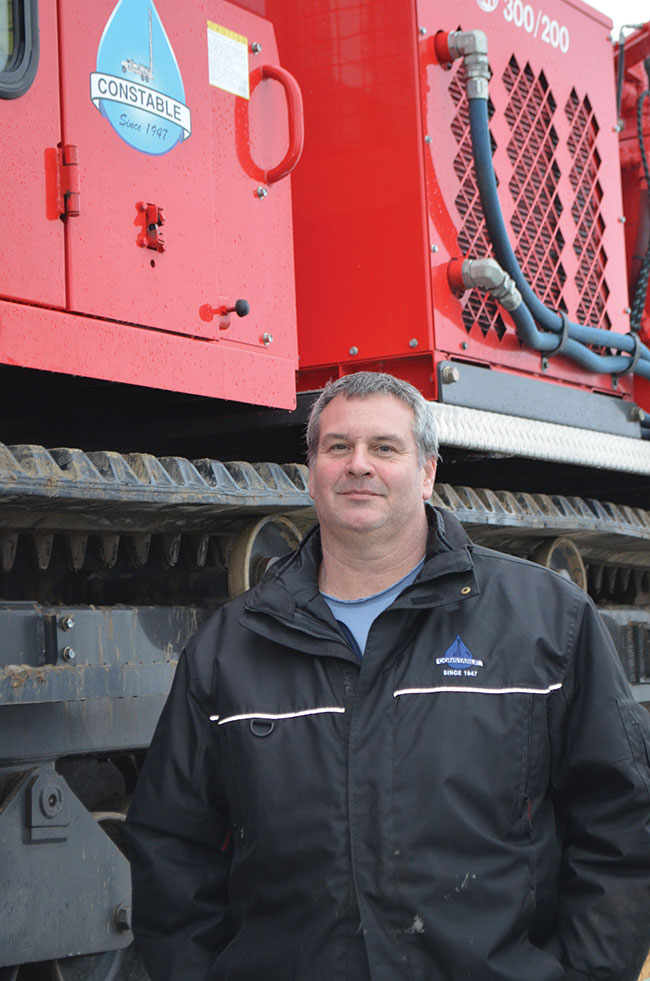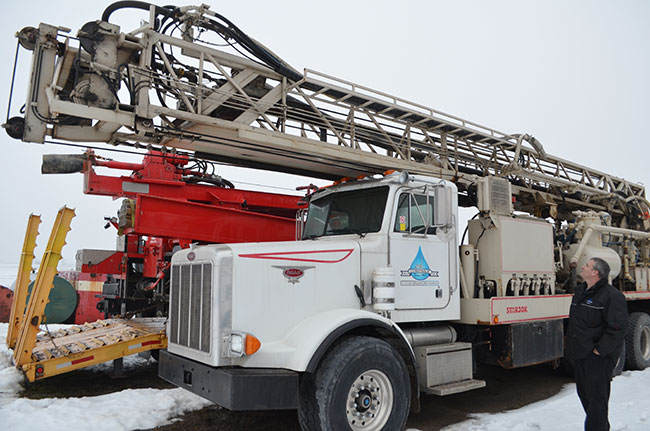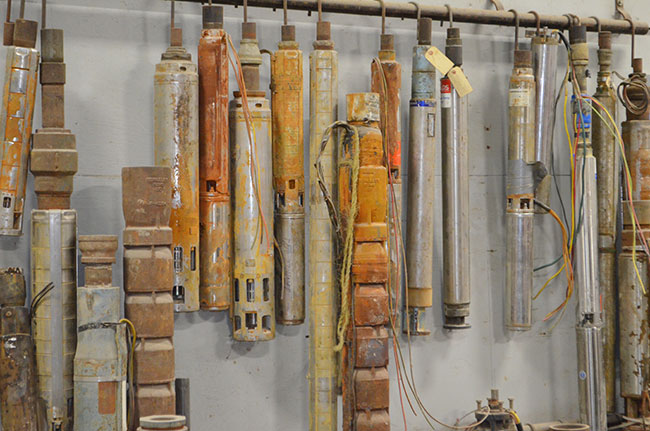
Features
Business
Success Stories
Power in numbers
Kevin Constable of Fred Constable and Son weighs in on safety, unity and three generations
January 8, 2015 By Carolyn Camilleri
We’re in the well-drilling business. We’re all nuts,” jokes Kevin Constable about Fred Constable and Son, the business his grandfather – that’s Fred – started in Maple, Ont., back in the mid-1940s.
We’re in the well-drilling business. We’re all nuts,” jokes Kevin Constable about Fred Constable and Son, the business his grandfather – that’s Fred – started in Maple, Ont., back in the mid-1940s.
 |
|
| Kevin Constable says the majority of the people in the industry are much better educated about aquifers and why they need to be protected. Advertisement
|
“Mr. Jackson [a neighbour] retired and no longer wanted to fix our well. He gave the tools to my grandfather and said, ‘Here, fix it yourself,’ ” and everything kind of spun from there,” says Constable.
Fred’s son Ken started working in the family business in 1962, the year before his son – that’s Kevin – was born. Twenty or so years later, Kevin graduated from the Resources Drilling Program at Sir Sandford Fleming College in Peterborough, and by May 1983 he was drilling full time. In 2001, the business moved to its current location in Bradford, where Constable now has six employees plus himself and his wife, Nicole, who runs the office.
In addition to more advanced equipment, something that has improved over the years is the knowledge behind the drilling. Constable says 40 or 50 years ago, drillers didn’t all understand aquifers and well hydraulics.
“Now we understand the aquifers better. We understand what we’re doing better. We’ve drilled a lot of wells in places that my grandfather drilled wells and had a heck of a time getting water,” he says. “We get lots because we just have more knowledge of how the aquifers work, along with much more modern equipment.”
Constable says the majority of the people in the industry are much better educated about aquifers and why they need to be protected.
“It’s important that that education is in place – however that education is provided, and there’s a thousand ways,” he says, referring to college programs, training, licensing and regulations. “By osmosis, the new people are educating the older people.”
Another change that’s occurred since his grandfather’s time is the introduction of Regulation 903, Ontario’s construction requirement for water-well drilling.
“Am I 100 per cent happy? Think it’s a perfect regulation? Of course not,” says Constable. “Overall, I think it is a pretty good regulation for ground water protection…. The only real reason that we even have a regulation is for ground water protection. At the end of the day, the Ministry of Environment really doesn’t care whether you know how to drill a well. That’s your business problem. Their concern is that you do it properly and that you’re not going to screw up that little piece of the aquifer.”
With regard to regulation compliance, Constable believes that most well drillers in the province are good at what they do, describing it as a fairly professional industry that does its best.
 |
|
| Kevin Constable eyes the company’s V50GTRX rubber track all-terrain carrier.
|
“The only downfall of the regulation in Ontario is the complete lack of inspection – inspection of construction practices,” says Constable, explaining that the low cost of contractor licences means that not a lot of money is available to pay water well inspectors.
“The way they used to do it, they used to have half a dozen well inspectors who would stop into a drill rig and just ask questions and see how you were doing things,” he says. “Now, they do it more on a call-in complaint basis. If there was more inspection, I think, in some cases, we’d have some better jobs done out there.”
When it comes to safety, that’s the Ministry of Labour and the Construction Safety Act. In recent years, there’s been more emphasis on safety.
“The safety requirements are probably the one thing that’s going to put people out of business,” says Kevin, explaining that while he agrees 100 per cent with safe work practices, the paperwork is a problem.
His wife Nicole – whom he affectionately refers to as the “safety Nazi” – spends about five hours a week on nothing but compliance paperwork for the Ministry of Labour.
“Our safety handbook, that’s in every one of my trucks, is a foot thick,“ he says. “The requirement for a two- or three-person company isn’t near what the requirements are when you have eight or nine employees. Still, it has to be done. It is a monumental task and it’s expensive.”
Constable says the Ontario Ground Water Association does a fantastic job of promoting safety across the industry.
“The association has a member and that’s what she does. She’s a safety consultant and she’s a member of the OGWA,” says Constable, referring to Ellaline Davies of Safety Works Consulting.
A criticism Constable has is how new safety regulations are created, describing them as “knee-jerk reactions.” By way of example, he says the OGWA had been chasing the MOE for years – long before they revamped the regulation – to add geothermal drilling. Because they weren’t drilling wells, the addition was rejected – until a natural pocket of methane gas was drilled into at depth, creating a gas risk.
“Inside of two weeks, they had a regulation that would just curl your hair,” says Constable.
Pushing for safety and regulatory changes is just one of the functions of the OGWA. And while the work it does benefits everyone in the industry, membership is not required.
 |
|
| Inside the shop, which moved to Bradford, Ont., in 2001.
|
“The association spent two years and countless hours of volunteer time to help the Ministry rewrite the regulation into something we could all live with and everybody gets the same regulation,” says Constable, who has been both an OGWA board member and president. “When the [OGWA] puts on a regional meeting, training time across the province every spring – which gets everybody CEC hours, the whole deal – well, it has to be offered to all the non-members as well. They get to come, do all the work that the association has put together.”
Moreover, the OGWA provides a common place for people to get information on everything to do with the industry, as well as assistance with regulatory problems and referrals when people call needing drill service.
And there’s power in numbers.
“If the OGWA could walk into the Ministry of Environment office and say, ‘Look, 99 per cent of the licensed well drillers in Ontario are members of this association. What are you going to do for us?’” says Constable about the stronger position the OGWA would have with the MOE if membership were to increase.
Yet attracting membership is always a challenge – something Constable would like to see remedied. “Because there’s no regulatory requirement to be a member, all of the people that refuse to pay that not very expensive membership fee every year get all the benefits of everything that the association does.”
“The association has been around for 63 years. A lot of good things have been done over those 63 years and a lot of good people have put a lot of effort into it for 63 years, but some things just never change,” says Constable.
Something that has changed is Constable’s business. While they still do plenty of domestic jobs, Constable says about half their drilling is commercial work in the city of Toronto.
“We saw the writing on the wall quite a few years ago that the domestic well drilling business in the southern part of the province was becoming a smaller market,” he says. “Between pipelines and the government, which basically said that the majority of development should, whenever possible, be attached to municipal services. They made it awfully difficult – not impossible but difficult – for developers to develop subdivisions where they require wells and septics.”
Where Constable’s grandfather and father drilled is all city water now. Drillers have to go farther out into farm country and cottage country to find work.
“Ontario’s a big place. It’s hard to really put a finger on the state of the whole industry in Ontario. There are areas of the province where well drilling is in top shape,” he says. “But Southwestern Ontario is a horrible place to be a well driller.”
While Constable admits he doesn’t know what the fix is, he does believe that drillers need to be looking at diversification of some kind, adding that, the real challenges to the industry are to stay current and flexible.
“There’s still a lot of work out there. There’s still good work, particularly, for the smaller companies – the mom-and-pop companies.”
Asked what he would like see change, Constable mentions the now-defunct Canadian Ground Water Association. While the demise of the CGWA is well known within the industry, the concept of a national association is something Constable supports.
“There’s no federal body that worries about ground water across the country, which is something that the Canadian Ground Water Association was trying to work towards, trying to work with the federal government.”
Constable’s vision was a training and certification body, where all the provincial associations would have access to material.
“It’s really difficult for the provincial associations to keep coming up with stuff that satisfies the continuing education criteria. If you had a national clearing house putting this stuff together – getting together, discussing it, making sure it was the way it needs to be, and then making that available to the whole country – it would be advantageous to everybody.”
Before that can happen, the provincial associations have to sit down and decide they want another Canadian association.
“I hope they do,” says Constable. “I firmly believe that the Canadian group is important.”
As far as the future of the industry, Constable says well drilling is an industry that supplies something people can’t do without.
“As long as we do our part and make an effort to make sure that a) we protect the ground-water sources, and that b) we continue to push to governments that development and new wells outside of town are a good thing, the future of the industry is bright. There’s still a lot of Ontario out there that needs wells drilled in it.”
Print this page